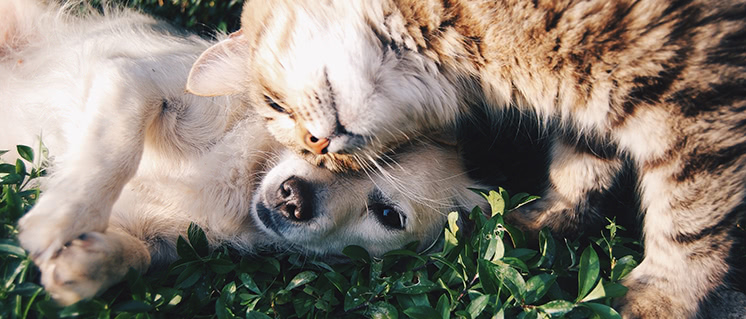From the kitchen to the great outdoors, and everywhere in between, your home has some expected and unexpected hazards that Fido and Tiger may encounter. If you’re one of the 85 million households in the United States cohabitating with a 4-legged Furry Friend, you may not be surprised to know that pet-parent’s spending is near $70 billion for 2017. We all work very hard to keep our Furry Friends Happy and Healthy!
Welcome back as we conclude our series on PET-PROOFING YOUR HOME.
Hazards in the Great Outdoors
- Plants and pets aren’t always a perfect combination. A surprising number of plants, including landscape and houseplant favorites, are toxic and even lethal if your furry friend decides to take a nibble. Some of the most common plants that should be kept away from your pets include: lily of the valley, oleander, azalea, yew, foxglove, sago palms, hibiscus and hydrangea, aloe, bird of paradise, to name a few.
- Outdoor garden supplies, such as compost, cocoa-based mulches, pesticides, insecticides and fertilizers can all cause problems for pets. Your first line of defense is keeping such things stored away safely and out of reach.
- Snail and slug bait is also toxic. If you need to keep your vegetables and other plants safe from these garden bandits, look for other barrier methods or pet-friendly bait formulations.
- Open doors and windows are great for letting in fresh air but not when they tempt your pets out into the scary world of cars and other dangers. Balconies can also be dangerous as small pets could slip through the railings or get stuck halfway.
- If Fido or Tiger do find their way outdoors, be sure they’re are heading into a safe place such as a fenced yard.
- Chemicals are an obvious source of trouble if pets drink from pools or spas. Even if pets can swim, they can still drown if they can’t get out by themselves. Your best approach is to keep your furry friends away from the water, either with covers or fencing or by keeping them inside, unless they’re accompanied.
- Ponds also pose a problem as they are prone to forming algae which may be toxic to pets.
- Just as fireplaces can be a danger indoors, ashes and flames from fire pits and BBQ’s can be another outdoor hazard.
WHAT TO DO IF YOUR PET IS POISONED?
Don’t wait! Time is critical for successfully treating accidental poisoning. Call your Vet OR the ASPCA Animal Poison Control Center at 888-426-4435. Be prepared to state your dog’s breed, age, weight and any symptoms. Have the product container or plant sample nearby to assist with identification so the appropriate treatment recommendations can be made.
We hope you found our final segment of our PET-PROOFING YOUR HOME Series informative and interesting.
To locate our recommended ANIMAL-RELATED organizations in Spring Hill and Brooksville of Hernando County, Florida, be sure to visit our “Trusted Vendors” on our website @ www.GailSellsFloridaHomes.com.
Until then… it’s all about YOU!


